Photographs: Mohamed Nureldin Abdallah/Reuters Bhupesh Bhandari in New Delhi
Pharmaceutical companies mushroomed indiscriminately till they became too numerous to regulate.
.Mumbai's Jaslok Hospital has advised its doctors not to prescribe medicine made by Ranbaxy Laboratories to their patients. Apollo Pharmacy, the country's largest chain of drug stores, has stopped selling Ranbaxy medicine and has suspended procurement from the company.
This comes after Ranbaxy, now majority-owned by Daiichi Sankyo of Japan, paid $500 million in the US for fudging data while seeking approvals from the Food and Drug Administration to launch products there.
Ranbaxy managing director and CEO Arun Sawhney has asserted that quality is no longer an issue, and he is willing to "stand behind every pill of Ranbaxy in any corner of the world".
But that doesn't seem to have helped. This isn't the first time that the quality of Indian medicine has come under suspicion.
A 2010 report by the International Policy Network found that seven per cent of drugs bought from wholesale traders were substandard, and 3.6 per cent of the drugs from traders contained no active ingredients whatsoever. Some of the spurious drugs contained chalk or talcum powder mixed with a pain reliever to trick and defraud the patient.
...
Why substandard and fake drugs are rampant in India
Image: Drugstore chain Walgreens flagship store on the corner of Sunset & Vine in Hollywood, California. Photo is for representation purpose only.Photographs: Fred Prouser/Reuters
As many as 92 per cent of pharmacists said they have been offered substandard or spurious drugs for cheaper prices. This happens because the sector is inadequately regulated - there are over 20,000 registered pharmaceutical companies in the country.
The task of monitoring so many companies is never going to be easy. India, as a result, is the most competitive and fragmented pharmaceutical market in the world. There are over a hundred brands for every off-patent medicine. A market share of a few percentage points is good enough to make you the leader in the market.
Also, because the market is hyper-competitive, pharmaceutical companies offer all kinds of inducements to doctors to boost sales. These can range from office stationery to refrigerators, televisions, cars, overseas junkets and even taking care of weddings in the family. The result is over-prescription.
The indiscriminate prescription of antibiotics has made India a major source of superbugs. Doctors in India continue to prescribe cough syrups, though they went out of use elsewhere ages ago. This state of affairs is a legacy of India's earlier patent laws. At the time of Independence, India had inherited a regime of product patents (meaning the drugs could not be copied by another manufacturing method).
...
Why substandard and fake drugs are rampant in India
Image: A pharmacy in Valencia, Spain. Photo is for representation purpose only.Photographs: Heino Kalis/Reuters
The government set up the Bakshi Tekchand Committee in the 1950s to see if the Patent Act of 1930 needed to be changed. This committee, however, failed to come up with any concrete proposal.
Meanwhile, Indian companies like Cipla had started to demand a change in the patent laws because they found their attempts to make medicines blocked by one patent or the other. All they could make were old drugs that had gone off-patent.
They realised they would never grow beyond a certain size. This was the time the government was moving towards self-reliance across sectors. Jawaharlal Nehru, then prime minister, was keen that India should have a vibrant domestic pharmaceutical industry.
To this effect, his government had set up two public sector units: Hindustan Antibiotics Ltd to make penicillin and Indian Drugs & Pharmaceuticals Ltd to make off-patent bulk drugs. The lobbying by the domestic companies didn't fall on deaf ears. The government was sympathetic to their cause also because the cost of medicine in India was very high.
In the early 1960s, the government set up the R S Iyengar Committee to trace the development of patent rules across the world, especially in developing countries.
...
Why substandard and fake drugs are rampant in India
Image: A pharmacy in Athens, Greece. Photo is for representation purpose only.Photographs: Yorgos Karahalis/Reuters
This committee brought about a paradigm shift in the debate over patents. It said the patent laws of a country needed to be linked to its state of development, and protection to scientific effort cannot come at the cost of the people. It was Indira Gandhi who finally decided to bite the bullet and amend the patent law.
The Patent Act of 1970 said India would respect only process patents. In one stroke, Indians were free to make any medicine in the world so long as they adopted a new process. The switch indeed led to the blossoming of process technologies in the country and brought down significantly the cost of medicine.
Over the next 30 years or so, Indian companies had a free run. (The party ended in 2005 when India reverted to product patents.) One problem that nobody had anticipated was overpopulation - pharmaceutical companies mushroomed indiscriminately till they became too numerous to regulate.
Many companies, not all, cut corners in order to protect their profit margins and glossed over processes to compress the go-to-market time.
...
Why substandard and fake drugs are rampant in India
Image: A pharmacy in Athens, Greece. Photo is for representation purpose only.Photographs: Yorgos Karahalis/Reuters
The rot runs deep. For example, a report of the Parliamentary Committee on Health and Family Welfare found that expert opinions necessary for drug approvals were ghost-written by the companies that had sought the approvals.
Reports sent in by different experts on the same drug were found to be exact copies of each other, with the same errors. The report said there was "ample evidence" to suggest that these expert opinions were "actually written by the invisible hand of the drug companies and experts merely obliged by putting their signatures".
To raise regulatory standards in the sector, the industry has proposed that India should become a member of the Pharmaceutical Inspection Convention, an association of drug regulators who agree to stick to certain standards. It is estimated that it will take India five years to raise its regulatory ecosystem to that level.

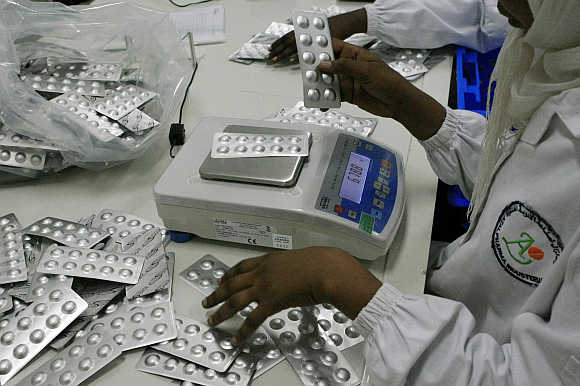
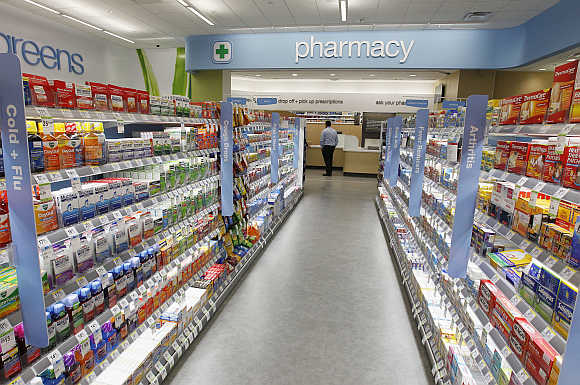
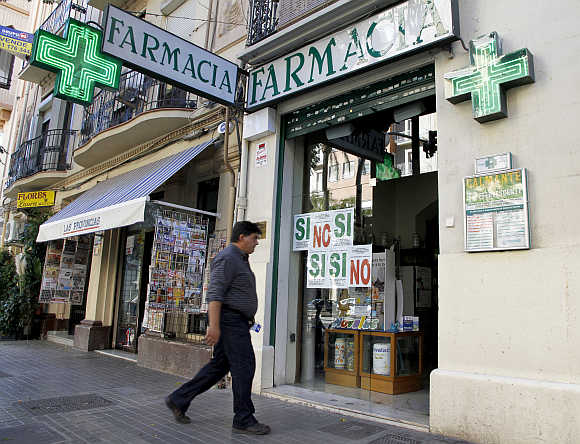
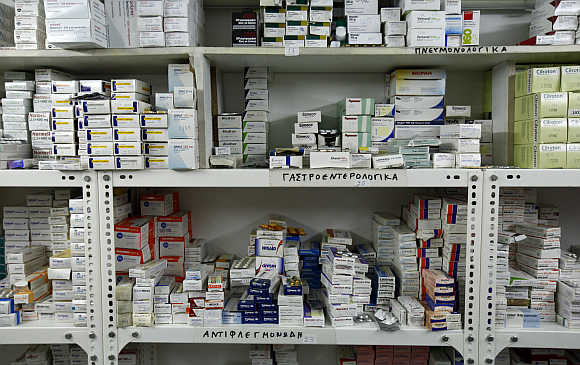
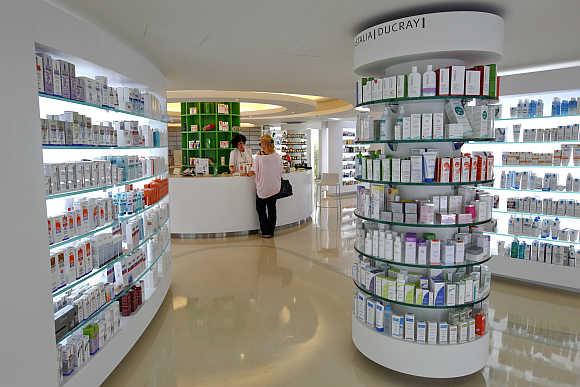

article